UK and Argentina agree to identify Falklands war dead
Two countries will work together to name more than 100 Argentinians killed in 1982 conflict
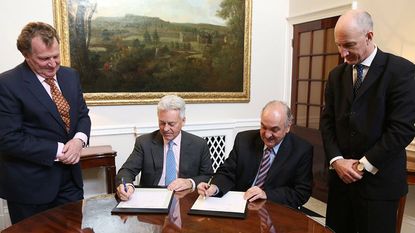
The UK has reached an agreement with Argentina to identify the remains of 123 Argentinian soldiers buried on the Falkland Islands following the 1982 war.
The International Committee of the Red Cross, which has been negotiating the deal, will now be able to take DNA samples from the remains of fighters buried at Darwin Cemetery on East Falkland.
At the moment, their gravestones say they are "only known by God", reports the BBC.
Subscribe to The Week
Escape your echo chamber. Get the facts behind the news, plus analysis from multiple perspectives.

Sign up for The Week's Free Newsletters
From our morning news briefing to a weekly Good News Newsletter, get the best of The Week delivered directly to your inbox.
From our morning news briefing to a weekly Good News Newsletter, get the best of The Week delivered directly to your inbox.
Under the terms of the agreement, the Red Cross will compare the DNA of the dead men with that of consenting relatives, says Reuters.
The Guardian reports that testing will begin next year and says the deal appears to be a sign that London and Buenos Aires "have made significant headway towards improving relations" since Argentinian President Mauricio Macri took office in November 2015.
Macri is seen to be more friendly over the issue than his predecessor, Cristina Kirchner, who renewed calls for sovereignty over "Las Malvinas", as the islands are known in Argentina.
Yesterday's deal was signed in the UK following talks in both London and in Buenos Aires between Foreign Office minister Sir Alan Duncan and Argentina's deputy foreign minister Pedro Villagra Delgado.
The two countries also agreed to speak with airport authorities in Brazil and Chile to increase the number of flights to the Falklands from the current one a month, which arrives from Chile.
In September, they also said they would work to remove restrictions on the oil and gas, fishing and shipping industries around the islands.
The Falklands war began after the islands were invaded by Argentina. During the 74 days of fighting, 649 Argentines and 255 Britons died.
Argentina continues to claim sovereignty over the islands, which lie more than 400 miles off the coast of South America, although the vast majority of its population say they wish to remain a British overseas territory.
Falkland Islands: Argentina to hold 'high level' talks with UK
15 September
Argentina's President Mauricio Macri has announced he is to hold "high-level" talks with UK officials on the future of the Falklands during next week's UN General Assembly.
Macri, who was elected last November on a promise to "bring Argentina in from the cold" after successive governments had made reclaiming the islands a priority, insists he is not renouncing his country's claim to the disputed territory. Rather, he says, he is determined to "chart a calmer course than his fiery predecessor [Cristina Fernandez de Kirchner], and establish good business and political relations with Britain", the Daily Telegraph reports.
"We know it won't be easy and will take time, but we must start," he said.
The talks come after a concerted effort to build confidence between the two countries after a decade of increasingly tense exchanges with former president Kirchner.
During a visit to London last week, Argentina's foreign minister Susana Malcorra, who is currently campaigning to be the next UN secretary-general, announced her government is willing to consider resuming direct flights to and from the Falkland Islands as a gesture of goodwill.
Falkland Islands: What new 'Argentine waters' ruling means
29 March 2016
An international commission has ruled that Argentina's territory should be expanded to include the waters surrounding the Falkland Islands, a move that is likely to inflame the country's tensions with Britain over the land.
The islanders voted overwhelmingly to remain British in a 2013 referendum, but more than three decades after they went to war, the UK and Argentina continue to battle over sovereignty.
Who made the ruling?
A group of experts known as the Commission on the Limits of the Continental Shelf, established under the 1982 United Nations Convention on the Law of the Sea but not a UN commission, as the BBC points out.
What has the response been?
Argentina hailed the decision as an "historic occasion", with foreign minister Susana Malcorra saying it "reaffirms our sovereignty rights over the resources of our continental shelf".
The Falklands legislative assembly, meanwhile, said it was attempting to contact the UK government to find out "what, if any, decisions have been made and what implications there may be".
Chairman Mike Summers added: "Our understanding has always been that the UN would not make any determination on applications for continental shelf extension in areas where there are competing claims."
Downing Street has played down the ruling, saying it had not yet received details of the report.
"It's important to note this is an advisory committee. It makes recommendations; they are not legally binding and the commission doesn't have jurisdiction to consider sovereignty issues," said Prime Minister David Cameron's spokesperson.
What does the ruling mean for the future?
The move would increase Argentina's waters in the South Atlantic by 35 per cent, the equivalent of more than half a million square miles.
"It leaves a question mark over natural resources in the South Atlantic, in particular oil exploration, which is already pumping millions of dollars into the Falkland Islands economy," says The Times.
The decision is also unlikely to improve diplomatic relations between London and Buenos Aires.
Argentina says the ruling will be key in its dispute with Britain over the islands, but Downing Street once again insisted the decision lies with the Falkland Islanders.
"They have been very clear that they want to remain an overseas territory of the UK and we will continue to support their right to determine their own future," it said.
Falklands: Corbyn is a bigger threat than Argentina, says defence minister
17 February 2016
Defence minister Michael Fallon has told Falkland Islanders that Jeremy Corbyn is a greater threat to their sovereignty than Argentina.
Fallon (pictured above), who is visiting the islands, accused the Labour leader of being "determined to override the wishes of the islanders" following his call for open dialogue with Argentina over the disputed land.
"The biggest threat at the moment isn't Argentina, it's Jeremy Corbyn and the Labour Party," he said.
He also placed a wreath at a memorial to the 255 British servicemen killed in the 1982 conflict, describing the war as a "liberation" in an accompanying handwritten note.
Fallon, the first defence minister to visit the South Atlantic islands in 14 years, has expressed a strong personal stance in favour of their continued British sovereignty, while the Ministry of Defence has earmarked £180m to rejuvenate their ageing defences. More than a quarter of a century after the Falklands War, 1,200 British military personnel are still stationed there.
However, his remarks were challenged by the chairman of the Islands' legislative assembly, Michael Summers, who told the BBC that Argentina "undoubtedly" posed a graver danger to the islanders' right to self-determination than the Labour Party.
Argentina's new president, Mauricio Macri, has signalled that his administration is open to a fresh perspective on the islands, which are known as Las Malvinas in Argentina. In contrast, his predecessor, Cristina Fernandez de Kirchner, was well known for her bullish stance on the dispute.
He discussed the issue when meeting David Cameron for the first time at the World Economic Forum summit in Davos in January.
After the meeting, Argentinian chancellor Susana Malcorra confirmed the Falklands would remain a point of contention, but said efforts would be made to broaden the scope of relations between Argentina and the UK.
Falklands: Cameron to hold talks with Argentinian president
19 January 2016
David Cameron will hold one-on-one talks with Argentina's newly elected President Mauricio Macri at this week's World Economic Forum meeting in Davos.
The meeting will "underscore a softening of rhetoric" over the disputed Falkland Islands in the wake of last month's change of government in Buenos Aires, says The Guardian.
The meeting follows on last November's telephone call between the two men following the Argentinian's election victory.
"Acknowledging the differences between the two countries, both leaders agreed the need to pursue a path of open dialogue and to work towards a stronger partnership," said Downing Street at the time.
The Falklands – known in Argentina as Las Malvinas – have long been a source of discontent between the two countries. A ten-week war over sovereignty in 1982 cost the lives of 655 Argentine troops, 255 British servicemen and three islanders. Tensions resurfaced again last year when Cameron condemned Argentina for threatening oil and gas companies exploring the islands.
In 2013, the islanders voted to remain part of Britain in a referendum.
Former Argentinian president Cristina Fernandez de Kirchner described Britain's presence on the islands as a "blatant exercise of colonialism", but Macri has vowed to take a "less aggressive" stance.
Labour leader Jeremy Corbyn weighed in on the debate this weekend, calling for Britain to engage in a "sensible dialogue" with Argentina over the islands.
Create an account with the same email registered to your subscription to unlock access.
Sign up for Today's Best Articles in your inbox
A free daily email with the biggest news stories of the day – and the best features from TheWeek.com
-
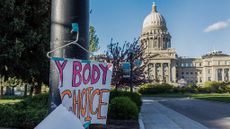 'Horror stories of women having to carry nonviable fetuses'
'Horror stories of women having to carry nonviable fetuses'Instant Opinion Opinion, comment and editorials of the day
By Harold Maass, The Week US Published
-
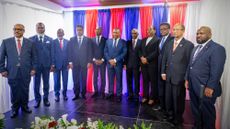 Haiti interim council, prime minister sworn in
Haiti interim council, prime minister sworn inSpeed Read Prime Minister Ariel Henry resigns amid surging gang violence
By Peter Weber, The Week US Published
-
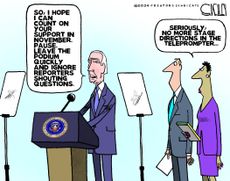 Today's political cartoons - April 26, 2024
Today's political cartoons - April 26, 2024Cartoons Friday's cartoons - teleprompter troubles, presidential immunity, and more
By The Week US Published
-
 Will Aukus pact survive a second Trump presidency?
Will Aukus pact survive a second Trump presidency?Today's Big Question US, UK and Australia seek to expand 'game-changer' defence partnership ahead of Republican's possible return to White House
By Sorcha Bradley, The Week UK Published
-
 Can Cameron put the Falklands sovereignty dispute to bed?
Can Cameron put the Falklands sovereignty dispute to bed?Today's Big Question Foreign secretary says issue 'not up for discussion' ahead of visit amid renewed push from Argentina
By The Week UK Published
-
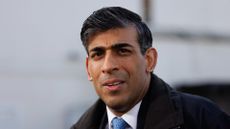 It's the economy, Sunak: has 'Rishession' halted Tory fightback?
It's the economy, Sunak: has 'Rishession' halted Tory fightback?Today's Big Question PM's pledge to deliver economic growth is 'in tatters' as stagnation and falling living standards threaten Tory election wipeout
By Harriet Marsden, The Week UK Published
-
 'A ridiculous amount of money pledged to someone who already was absurdly rich'
'A ridiculous amount of money pledged to someone who already was absurdly rich'Instant Opinion Opinion, comment and editorials of the day
By Harold Maass, The Week US Published
-
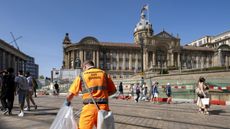 Why your local council may be going bust
Why your local council may be going bustThe Explainer Across England, local councils are suffering from grave financial problems
By The Week UK Published
-
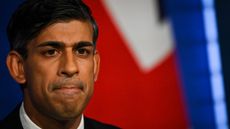 Rishi Sunak and the right-wing press: heading for divorce?
Rishi Sunak and the right-wing press: heading for divorce?Talking Point The Telegraph launches 'assault' on PM just as many Tory MPs are contemplating losing their seats
By Keumars Afifi-Sabet, The Week UK Published
-
 How would a second Trump presidency affect Britain?
How would a second Trump presidency affect Britain?Today's Big Question Re-election of Republican frontrunner could threaten UK security, warns former head of secret service
By Harriet Marsden, The Week UK Published
-
 'Rwanda plan is less a deterrent and more a bluff'
'Rwanda plan is less a deterrent and more a bluff'Instant Opinion Opinion, comment and editorials of the day
By The Week UK Published